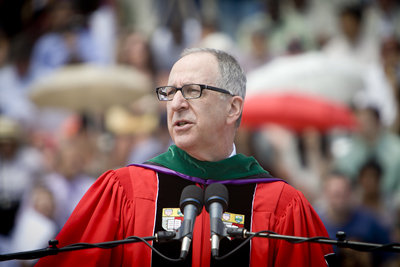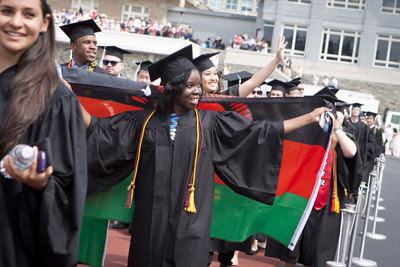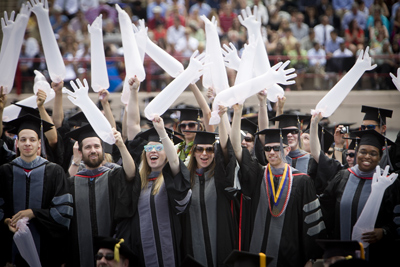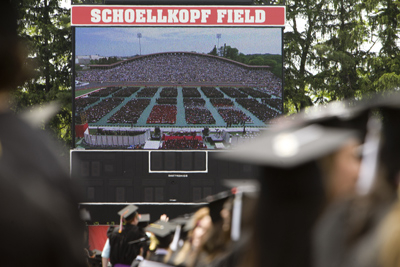President Skorton urges graduates to 'engage the world'
By Nancy Doolittle




Commencements are optimistic statements about the future, said Cornell President David Skorton, under mostly sunny skies, addressing about 5,000 new graduates at Cornell's 144th Commencement Ceremony May 27, and the graduates, he added, "give us all good reason to believe that the future will be better than today."
This July marks the 150th year since the federal Morrill Act of 1862 was signed into law -- a "hopeful, optimistic piece of legislation," Skorton noted, that created Cornell and other land-grant universities. In the "land-grant tradition," this year's graduates have embraced Cornell's commitment to public engagement, he said: "You have risen to the challenges we have put before you, and in the process you have already made a difference here in Ithaca and around the world."
Skorton cited how students, for example, helped residents of Owego recover from last fall's devastating floods, taught college-level courses to inmates at the Auburn Correctional Facility through the Cornell Prison Education Program, participated in the Translator Interpreter Program that trains bilingual students and staff to serve as volunteer interpreters for community agencies, and produced a chapbook, "Poetry in Your Pocket," for a public poetry event for K-12 students in midtown Manhattan.
Many of the grandparents or great-grandparents of those graduating took the tradition of civic and political involvement to "unprecedented levels" in the years after World War II, Skorton said, saluting Charles F. Feeney '56, for example, who was present in the audience of 37,515, for his "extraordinary engagement."
A first-generation college student of modest means who later made his fortune pioneering the concept of duty-free shopping, Feeney has supported many philanthropic endeavors as well as providing nearly $1 billion to Cornell for such initiatives as Cornell Tradition; the Cornell International Institute for Food, Agriculture and Development; the Residential Initiative; and, most recently, the CornellNYC Tech campus on Roosevelt Island in New York City, Skorton said.
"What happens next?" Skorton asked the graduates. "How will you engage the world once you leave the campus -- whether for a job, or graduate or professional school, or other opportunities?"
He offered several considerations.
"First, you can make a contribution whether you are trained in the sciences, or technical fields like engineering or the social sciences, arts or humanities," he said, like Susan McCouch, Ph.D. '90, professor of plant breeding, who is a world expert on rice genetics, and Jeffrey Gettleman '94, who majored in philosophy and now is the East Africa bureau chief for The New York Times and a Pulitzer Prize winner.
Second, Skorton said, "recognize that making a living and making a difference in the world are not mutually exclusive undertakings." Everyone can't be social entrepreneurs like Josh Tetrick '04, founding CEO of the nonprofit 33needs, Skorton acknowledged, but all can be advocates for workplace policies that allow employees to make a living yet have a rich family and community life.
"Third, yours is the first generation to grow up with Facebook and YouTube, with tweeting and texting," he said. "Tap the power of these digital innovations while also recognizing the never-ending importance of communicating person to person and face to face." Personal connections are still essential for a satisfying life and critical for public engagement and social change, Skorton said.
Finally, he said, "in this election year, I hope you will express your civic commitment through participation in politics." He noted that many participated in Ithaca's local elections last November and filled Lynah Rink recently to hear presidential candidate Ron Paul.
Skorton concluded: "Go out there and do something remarkable. Help others realize their dreams. We believe in you. I believe in you. I am counting on you. Thank you."
Get Cornell news delivered right to your inbox.
Subscribe